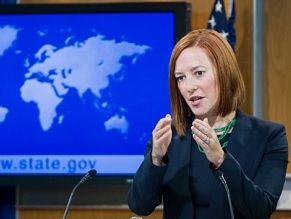|
World Jewish News

US State Department Spokeswoman Jen Psaki (photo credit: AFP/Paul J. Richards)
|
US ‘counts’ on Israel to be committed to 2-state solution
10.03.2015, Israel and the World The US government said it remains committed to a two-state solution to the Israeli-Palestinian conflict and expects to have Israeli and Palestinian partners who are committed to that goal as well.
A day after a confusing back and forth in which the Prime Minister’s Office denied that Prime Minister Benjamin Netanyahu had backed away from his support in principle for a two-state solution and that he had ruled out ceding any territory to the Palestinians, State Department spokeswoman Jen Psaki said US “commitment to achieving an end to the Israeli-Palestinian conflict through a two-state negotiated solution remains strong” and that the US “count[s] on having Israeli and Palestinian partners who are also committed to that goal.”
Pushed on a response to remarks attributed to Netanyahu which seemed to indicate that the creation of a Palestinian state would not be viable in the current Mideast climate, Psaki said: “A lot of things are said during election campaigns. We’ll wait to see the policies of the next Israeli government.”
Psaki refused to comment on the publication in Yedioth Ahronoth last week of a document purportedly drafted by Israeli officials outlining the PM’s alleged concessions to the Palestinians alluded to in Gal-on’s statement.
According to the document, Netanyahu agreed to negotiate a peace deal on the basis of the 1967 borders, with land swaps; to acknowledge Palestinian aspirations in East Jerusalem; to evacuate settlers from the West Bank; and to allow those who so choose to remain under Palestinian rule.
“I’m not going to weigh in on internal Israeli politics,” Psaki said.
On Sunday, Netanyahu had been quoted saying that the creation of a Palestinian state, a move that he supported in a famous speech at Bar-Ilan University in 2009, was no longer relevant in the current reality in the Middle East, and that there would be no territorial withdrawals.
“Prime Minister Benjamin Netanyahu said that any evacuated territory would fall into the hands of Islamic extremism and terror organizations supported by Iran. Therefore, there will be no concessions and no withdrawals. It is simply irrelevant,” read a statement released by his Likud party.
However, the Prime Minister’s Office insisted later Sunday that he had “never said any such thing.”
The confusion underlined Netanyahu’s efforts to maintain backing on the right without alienating other potential supporters and the international community ahead of the March 17 elections.
The back and forth statements came after the “Olam Kattan” newsletter, distributed in synagogues on Friday nights, published a Q&A with the Likud and other parties in which one Likud response claimed the policies expressed by Netanyahu in his Bar-Ilan speech “have been annulled.”
“Netanyahu’s entire political biography is the struggle against the establishment of the Palestinian state,” the response said. Haaretz reported that Likud MK Tzipi Hotovely, a proponent of annexing the West Bank, had drafted this answer.
The Likud campaign clarified on Sunday that “Netanyahu did not make any statement to the effect that the Bar Ilan speech was annulled.” With that, both the Likud and the Prime Minister’s Office noted that Netanyahu had long maintained that “under current conditions in the Middle East any land that is handed over would be grabbed by Islamist extremists.”
The Times of Israel
|
|
